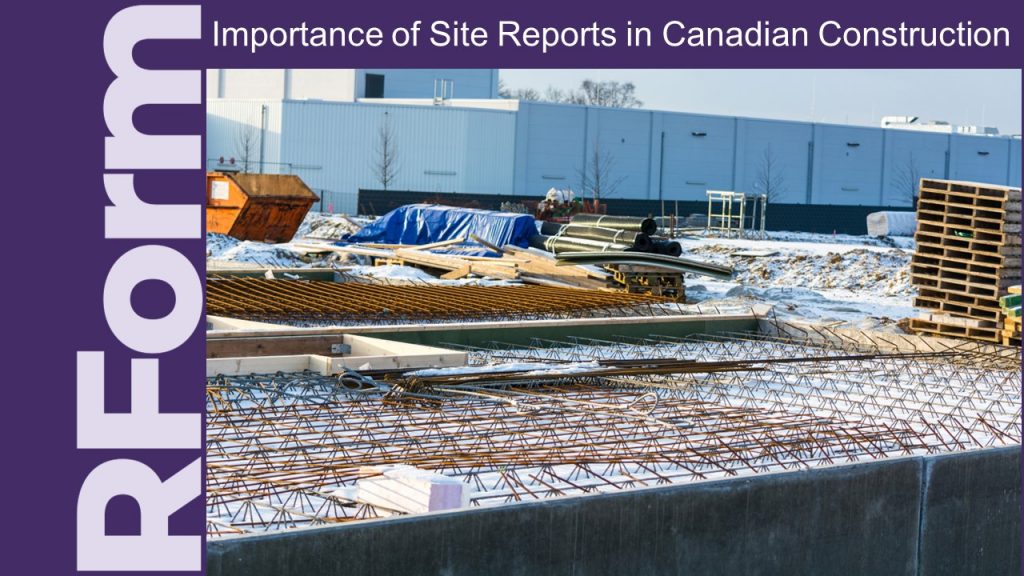
Site reports serve as a critical communication tool in Canadian construction projects, providing valuable insights into the progress, challenges, and activities on the site. These reports enable project stakeholders to stay informed and make informed decisions based on real-time information. By documenting project updates and progress, site reports ensure transparency and accountability. They also highlight any issues or challenges on site, allowing for timely resolution and mitigation. Adhering to legal and compliance requirements, these reports are crucial in documenting site activities and ensuring the project complies with Canadian construction regulations. Ultimately, site reports facilitate effective communication among project stakeholders, enhance collaboration, and support efficient decision-making in construction projects.
Benefits of Site Reports in Construction Projects
- They provide a comprehensive overview of project updates and progress, keeping all stakeholders informed.
- These reports highlight any issues or challenges on site, allowing for timely resolution and mitigation.
- Site reports help ensure compliance with Canadian construction regulations by documenting site activities.
- Reports facilitate effective communication among project stakeholders, enhancing collaboration and supporting efficient decision-making.
By utilizing digital tools and integrating site reports with RForm Contract Administration Software, reporting processes can be streamlined and more efficient. Overall, site reports are vital in construction projects, promoting transparency, accountability, and successful outcomes.
Key components of site reports include project updates and progress reports, which provide a comprehensive overview of the project’s status and advancements. These reports also highlight any issues or challenges on site, ensuring timely resolution and mitigation. By documenting site activities, site reports help ensure compliance with Canadian construction regulations and legal requirements. Additionally, effective communication among project stakeholders is facilitated through site reports, promoting collaboration and supporting efficient decision-making. Technology solutions such as digital tools and integration with construction management software streamline site reporting processes, allowing for real-time reporting and improved efficiency. These key components play a crucial role in successful construction projects in Canada.
Project updates and progress reports are vital components of site reports in Canadian construction projects. These reports provide a comprehensive overview of the project’s status and advancements, ensuring all stakeholders are informed about the progress. By documenting project updates, including completed tasks and milestones achieved, teams can track the project’s timeline and identify potential delays or issues. This allows for timely resolution and mitigation strategies to be implemented, keeping the project on track. Project updates and progress reports also serve as a communication tool, allowing stakeholders to stay informed and make informed decisions regarding the project’s direction.
Issues and challenges on-site are crucial aspects of site reports in Canadian construction projects. These reports document any obstacles or difficulties encountered during the project, informing stakeholders of potential risks and problems. By addressing these issues in the site reports, teams can implement mitigation strategies and find solutions to minimize delays and disruptions. Issues such as inclement weather, material shortages, equipment breakdowns, or changes in project scope are recorded in detail, providing a comprehensive overview of the project’s challenges. This information is essential for decision-making, resource allocation, and ensuring the project stays on track despite setbacks.
Legal and compliance aspects of site reports are crucial in Canadian construction projects to ensure adherence to regulations and mitigate risks. Site reports document important details such as permits, inspections, safety measures, and environmental compliance, providing a comprehensive record of the project’s compliance with legal requirements. By accurately documenting these aspects, stakeholders can demonstrate due diligence, track potential violations or non-compliance issues, and promptly address them. Additionally, site reports serve as evidence in legal disputes or claims, protecting the interests of all parties involved. It is essential to prioritize accurate and thorough documentation of legal and compliance aspects to maintain project integrity and ensure a successful construction process.
Accurate and detailed documentation of site activities is crucial in construction projects to ensure transparency, accountability, and effective communication among project stakeholders. It allows for a clear understanding of the work progress, potential issues that arise, and actions taken to address them. By documenting site activities, stakeholders can easily track project milestones, monitor compliance with regulations, and identify deviations from the original plans. This documentation also serves as valuable evidence in case of disputes or legal claims, protecting the interests of all parties involved. Therefore, the importance of documenting site activities cannot be overstated in ensuring successful construction projects in Canada.
Adherence to Canadian Construction Regulations is crucial for ensuring safety, quality, and compliance in construction projects. Site reports are vital in documenting and monitoring adherence to these regulations. They provide a detailed record of activities, inspections, and certifications related to regulatory requirements. By documenting site activities, such as inspections, permits, and compliance checks, stakeholders can ensure that the project meets all legal obligations and standards. This includes adherence to building codes, environmental regulations, health and safety guidelines, and other applicable laws. Site reports serve as evidence of compliance and help mitigate risks associated with non-compliance, ensuring that construction projects in Canada are carried out according to the highest standards.
Facilitating Communication Among Project Stakeholders: Site reports are crucial in facilitating communication among project stakeholders by providing them with updates on progress, issues, and challenges on the construction site. They enable effective collaboration and informed decision-making, helping teams identify potential bottlenecks and make necessary adjustments. Stakeholders can stay informed about the project’s status and address any concerns promptly. By documenting activities and observations, site reports serve as a central source of information that promotes transparency and accountability. This fosters better coordination among stakeholders, ensuring everyone is on the same page and working towards the project’s success.
Enhancing Collaboration and Decision-Making: Site reports promote collaboration among project stakeholders by providing a shared understanding of project status. They enable teams to identify and address issues promptly, facilitating effective decision-making. Stakeholders can review the progress, challenges, and updates documented in the reports, allowing for informed discussions and coordinated actions. By fostering open communication channels, site reports encourage collaboration between different parties involved in the construction project, including contractors, subcontractors, architects, and clients. This collaborative approach ensures that all stakeholders align with project goals, improving efficiency and successful outcomes.
Digital tools have revolutionized site reporting in Canadian construction projects, particularly real-time reporting. These tools enable construction teams to instantly capture and document project updates, progress, and challenges on site. By utilizing digital tools such as mobile applications or cloud-based platforms like RForm, teams can input data directly into a centralized system, eliminating the need for manual paperwork and reducing the risk of errors or delays. Real-time reporting through RForm ensures that stakeholders have access to timely and accurate information, facilitating effective decision-making and improving overall project communication. With instant access to site reports, construction teams can address issues promptly and keep all parties involved informed throughout the project lifecycle.
Digital tools are also crucial in streamlining site reporting processes, enabling real-time reporting and efficient communication. Construction teams can leverage these technology solutions to capture and document on-site project updates, progress, and challenges. These tools provide a centralized platform for stakeholders to access and collaborate on-site reports, facilitating effective decision-making. Teams can automate data collection and analysis by integrating site reports with RForm Contract Administration software, ensuring accurate and timely reporting. The use of technology solutions not only improves efficiency but also enhances transparency and accountability in Canadian construction projects. Moving forward, advancements in reporting practices will continue to shape the future of site reporting, revolutionizing communication and coordination in the industry.
Integrating site reports with construction management software like RForm is crucial in streamlining project communication and efficiency. By connecting site reports to a centralized software platform, construction teams can easily access and analyze real-time data, track project progress, and identify potential bottlenecks or issues. This integration allows for seamless collaboration among all stakeholders, including contractors, architects, and owners, ensuring everyone is on the same page and can make informed decisions based on the most up-to-date information. Additionally, integrating site reports with construction management software improves accountability and transparency by providing a comprehensive record of all project activities, documentation, and communications.
Recap of the Significance of Site Reports in Canadian Construction: Site reports play a crucial role in Canadian construction projects by providing real-time updates on project progress, documenting any issues or challenges faced, ensuring legal compliance, facilitating communication among stakeholders, and enhancing collaboration and decision-making. These reports are essential for project transparency, accountability, and efficiency. By integrating site reports with construction management software and utilizing digital tools for real-time reporting, construction teams can streamline communication, access accurate data, and make informed decisions based on up-to-date information. Moving forward, advancements in reporting practices will continue to improve the effectiveness of site reports in Canadian construction, further enhancing project outcomes.
Advancements in reporting practices continue to shape the future of site reports in Canadian construction. Digital tools and construction management software like RForm allow for real-time reporting, improving accuracy and efficiency. Integrating these technologies streamlines communication and ensures swift decision-making. With these advancements, site reports will become even more effective in capturing project updates, documenting challenges, and facilitating stakeholder collaboration. As the industry embraces technological solutions, the future outlook for site reporting in Canadian construction is promising. With enhanced communication and access to accurate data, construction projects can be executed more efficiently, improving project outcomes.

